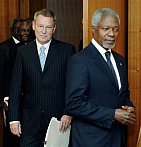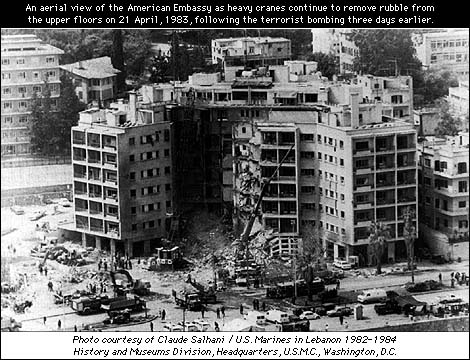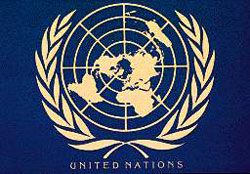 By Barry Schweid, Associated Press | October 22, 2005 WASHINGTON -- President Bush yesterday said the UN should deal quickly and seriously with a report implicating Syria in the assassination of Lebanon's former prime minister, a killing that led to protests and the withdrawal of Syrian troops from Lebanon after nearly 30 years as overlord.''The report strongly suggests that the politically motivated assassination could not have taken place without Syrian involvement," Bush said.In Damascus, Syrian leaders dismissed the findings and the government of President Bashar Assad prepared to fight growing Western sentiment to punish it with economic sanctions.Imad Moustapha, Syrian ambassador to the United States, said the report was baseless and the Bush administration was motivated by Syria's opposition to the war in Iraq.He said of the report, in Washington, ''It will only help fuel anti-American sentiment around the world."The report was likely to worsen the divisions between Lebanon's pro- and anti-Syrian groups. Syria's opponents in Lebanon welcomed the findings as the long-awaited truth about the assassination and about Syrian interference in Lebanese affairs. Pro-Syrian politicians vigorously criticized the findings.The United Nations investigative report, which Bush called ''deeply disturbing," made a link between high-ranking Syrian officials and their Lebanese allies in the car bombing that killed Rafik Hariri and 20 others in February.
By Barry Schweid, Associated Press | October 22, 2005 WASHINGTON -- President Bush yesterday said the UN should deal quickly and seriously with a report implicating Syria in the assassination of Lebanon's former prime minister, a killing that led to protests and the withdrawal of Syrian troops from Lebanon after nearly 30 years as overlord.''The report strongly suggests that the politically motivated assassination could not have taken place without Syrian involvement," Bush said.In Damascus, Syrian leaders dismissed the findings and the government of President Bashar Assad prepared to fight growing Western sentiment to punish it with economic sanctions.Imad Moustapha, Syrian ambassador to the United States, said the report was baseless and the Bush administration was motivated by Syria's opposition to the war in Iraq.He said of the report, in Washington, ''It will only help fuel anti-American sentiment around the world."The report was likely to worsen the divisions between Lebanon's pro- and anti-Syrian groups. Syria's opponents in Lebanon welcomed the findings as the long-awaited truth about the assassination and about Syrian interference in Lebanese affairs. Pro-Syrian politicians vigorously criticized the findings.The United Nations investigative report, which Bush called ''deeply disturbing," made a link between high-ranking Syrian officials and their Lebanese allies in the car bombing that killed Rafik Hariri and 20 others in February.
 UNITED NATIONS Oct 20, 2005
UNITED NATIONS Oct 20, 2005
 By CLAUDE SALHANI UPI International Editor WASHINGTON, Oct. 19 (UPI) -- Quite unlike the invasion of Iraq, the U.S. Marines in Lebanon came in peace -- and at the request of the Lebanese government. This Sunday, Oct. 23, will mark the 22nd anniversary of the bombing of the Marine barracks in Beirut where 241 U.S. servicemen, mostly Marines, lost their lives. At approximately 6:22 a.m. on Sunday, Oct. 23, 1983, a lone terrorist driving a yellow Mercedes-Benz stake-bed truck loaded with explosives accelerated through the public parking lot south of the 24th Marine Amphibious Unit Battalion Landing Team headquarters building, detonating about 12,000 pounds of hexogen. According to the official Department of Defense commission report, the force of the explosion ripped the building from its foundation. The building then imploded upon itself and almost all of the occupants were crushed or trapped inside the wreckage.
By CLAUDE SALHANI UPI International Editor WASHINGTON, Oct. 19 (UPI) -- Quite unlike the invasion of Iraq, the U.S. Marines in Lebanon came in peace -- and at the request of the Lebanese government. This Sunday, Oct. 23, will mark the 22nd anniversary of the bombing of the Marine barracks in Beirut where 241 U.S. servicemen, mostly Marines, lost their lives. At approximately 6:22 a.m. on Sunday, Oct. 23, 1983, a lone terrorist driving a yellow Mercedes-Benz stake-bed truck loaded with explosives accelerated through the public parking lot south of the 24th Marine Amphibious Unit Battalion Landing Team headquarters building, detonating about 12,000 pounds of hexogen. According to the official Department of Defense commission report, the force of the explosion ripped the building from its foundation. The building then imploded upon itself and almost all of the occupants were crushed or trapped inside the wreckage.
"It was one of the largest noises I've ever heard in my entire career," said retired Marine Maj. Robert T. Jordan, the 24th MAU public affairs officer at the time of the bombing. Jordan was in his rack in an adjacent building when the explosion split the still morning air and showered him with glass and pulverized concrete. It was also the heaviest loss the Marine Corps suffered in any single day since the battle of Iwo Jima during World War II. A few moments later another suicide bomber rammed his truck into the "Drakkar," a building occupied by French paratroopers. Fifty-eight French soldiers perished in this attack. The Marines, the French, the Italian and the Brits had come in peace -- to help secure peace in Lebanon.
 THE United States and France plan to introduce two UN resolutions next week aimed at holding Syria to account for meddling in Lebanon and for its alleged links to the assassination of former Lebanese prime minister Rafiq Hariri.The moves
THE United States and France plan to introduce two UN resolutions next week aimed at holding Syria to account for meddling in Lebanon and for its alleged links to the assassination of former Lebanese prime minister Rafiq Hariri.The moves
Khazen History


Historical Feature:
Churches and Monasteries of the Khazen family

St. Anthony of Padua Church in Ballouneh
Mar Abda Church in Bakaatit Kanaan
Saint Michael Church in Bkaatouta
Saint Therese Church in Qolayaat
Saint Simeon Stylites (مار سمعان العامودي) Church In Ajaltoun
Virgin Mary Church (سيدة المعونات) in Sheilé
Assumption of Mary Church in Ballouneh
1 - The sword of the Maronite Prince
2 - LES KHAZEN CONSULS DE FRANCE
3 - LES MARONITES & LES KHAZEN
4 - LES MAAN & LES KHAZEN
5 - ORIGINE DE LA FAMILLE
Population Movements to Keserwan - The Khazens and The Maans
ما جاء عن الثورة في المقاطعة الكسروانية
ثورة أهالي كسروان على المشايخ الخوازنة وأسبابها
Origins of the "Prince of Maronite" Title
Growing diversity: the Khazin sheiks and the clergy in the first decades of the 18th century
Historical Members:
Barbar Beik El Khazen [English]
Patriach Toubia Kaiss El Khazen(Biography & Life Part1 Part2) (Arabic)
Patriach Youssef Dargham El Khazen (Cont'd)
Cheikh Bishara Jafal El Khazen
Patriarch Youssef Raji El Khazen
The Martyrs Cheikh Philippe & Cheikh Farid El Khazen
Cheikh Nawfal El Khazen (Consul De France)
Cheikh Hossun El Khazen (Consul De France)
Cheikh Abou-Nawfal El Khazen (Consul De France)
Cheikh Francis Abee Nader & his son Yousef
Cheikh Abou-Kanso El Khazen (Consul De France)
Cheikh Abou Nader El Khazen
Cheikh Chafic El Khazen
Cheikh Keserwan El Khazen
Cheikh Serhal El Khazen [English]
Cheikh Rafiq El Khazen [English]
Cheikh Hanna El Khazen
Cheikha Arzi El Khazen
Marie El Khazen